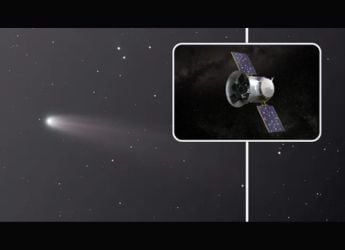- Home
- Laptops
- Laptops News
- 'One Small Nibble for Man': 3D Printer Makes Meat in Space
'One Small Nibble for Man': 3D Printer Makes Meat in Space
The bioprinter produced beef, rabbit, and fish tissue using magnetic fields in microgravity.

Photo Credit: Yuri KADOBNOV / AFP
Russian cosmonaut Oleg Skripochka (on screen) gestures in the ISS as he poses with the 3D bioprinter
The prospect of astronauts tucking into a roast dinner has grown slightly closer after a successful experiment used a 3D printer to create meat on the International Space Station.
The bioprinter produced beef, rabbit, and fish tissue using magnetic fields in microgravity, a Russian medical technology company involved in the experiment said Wednesday.
The experiment -- an international collaboration involving US, Russian and Israeli companies -- was carried out in September by cosmonaut Oleg Skripochka in the station's Russian segment using a 3D printer developed in Moscow.
The creators say it is the first to create a small amount of artificial meat in conditions of weightlessness.
"It's one small nibble for man, one giant bite for mankind," said Yusef Khesuani of 3D Bioprinting Solutions, the Russian laboratory that created the bioprinter.
The laboratory was founded by Invitro, a large Russian private medicine company.
The Roscosmos space agency part-financed the experiment as of national importance.
"It was really a breakthrough both for Roscosmos and Russia as a whole," said Nikolai Burdeiny, executive director of the state space corporation, which includes Roscosmos.
"For us it was the first experience of international scientific collaboration in space," Khesuani said, using cells provided by Israeli and US food-tech companies.
"Thank God the experiment went successfully... All the cells showed a good result in space," he added.
Astronauts eat meat on board that is vacuum-packed or dried on Earth but this technology could ultimately be necessary for long voyages into deep space, said veteran cosmonaut Oleg Kononenko.
"If we're going to fly further from Earth to other planets in the solar system, we can't take that volume of food with us," he told AFP.
"In any case we will have to grow and produce food onboard the spaceship."
"I think progress is developing very quickly, science and knowledge, and I think this will be within our lifetimes," he said.
Creating larger amounts of meat in the Russian segment will need more complex equipment than the current printer, said Khesuani.
"Then we can create not just small objects but big ones, made of a large mass of cells."
"I hope we will continue these experiments."
Other space agencies are also carrying out experiments in this area as making human tissue in space is easier than in conditions of gravity.
An American 3D printer launched to the station in July can manufacture human tissue and is also being used for experiments by the European Space Agency.
Get your daily dose of tech news, reviews, and insights, in under 80 characters on Gadgets 360 Turbo. Connect with fellow tech lovers on our Forum. Follow us on X, Facebook, WhatsApp, Threads and Google News for instant updates. Catch all the action on our YouTube channel.
Related Stories
- Samsung Galaxy Unpacked 2025
- ChatGPT
- Redmi Note 14 Pro+
- iPhone 16
- Apple Vision Pro
- Oneplus 12
- OnePlus Nord CE 3 Lite 5G
- iPhone 13
- Xiaomi 14 Pro
- Oppo Find N3
- Tecno Spark Go (2023)
- Realme V30
- Best Phones Under 25000
- Samsung Galaxy S24 Series
- Cryptocurrency
- iQoo 12
- Samsung Galaxy S24 Ultra
- Giottus
- Samsung Galaxy Z Flip 5
- Apple 'Scary Fast'
- Housefull 5
- GoPro Hero 12 Black Review
- Invincible Season 2
- JioGlass
- HD Ready TV
- Laptop Under 50000
- Smartwatch Under 10000
- Latest Mobile Phones
- Compare Phones
- Redmi Turbo 5
- Redmi Turbo 5 Max
- Moto G77
- Moto G67
- Realme P4 Power 5G
- Vivo X200T
- Realme Neo 8
- OPPO Reno 15 FS
- HP HyperX Omen 15
- Acer Chromebook 311 (2026)
- Lenovo Idea Tab Plus
- Realme Pad 3
- HMD Watch P1
- HMD Watch X1
- Haier H5E Series
- Acerpure Nitro Z Series 100-inch QLED TV
- Asus ROG Ally
- Nintendo Switch Lite
- Haier 1.6 Ton 5 Star Inverter Split AC (HSU19G-MZAID5BN-INV)
- Haier 1.6 Ton 5 Star Inverter Split AC (HSU19G-MZAIM5BN-INV)
















